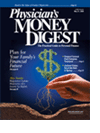Publication
Article
Physician's Money Digest
Come to Terms with Today's Fiscal Terms
Author(s):
The financial world has a languageof its own. Fortunately,there are many resources availableto help you understand thelingo. Following is a list of the most commonterms and their definitions.
• Asset class. This term is used forcategorizing different types of investments.There are basically three assetclasses: stocks, bonds, and cash.
• Asset allocation. This refers to howmuch of your money you put into stocks,bonds, and cash equivalents. It's theprocess of selecting and blending investmentsfrom different asset categories toreduce investment risk and reach longtermfinancial goals.
• Diversification. After you determinethe proper asset allocation, it's time todiversify. Diversification is the process ofdeciding what mix of investments to ownwithin each asset category. Owning stockin companies from a variety of industriesputs you in a position to reap the benefitsfrom different sectors of the economy.
• Blue chip. This term typically refersto the common stock of a company thatis known nationally for the quality of itsproducts or services.
• Dividend. When a company decidesto share its profits with investors, it usuallypays a dividend to stockholders. Thecompany's board of directors decideswhen these payments are made and howmuch they'll be. Dividends are usuallypaid quarterly in cash or additional stock.
• Commodity. As opposed to stocksand bonds, which are simply valuablepieces of paper, commodities include tangibleproducts that are traded on anauthorized commodity exchange. Thereare many different types of commodities,including agricultural products, metals,and petroleum. Additionally, foreign currencies,financial instruments, and indexescan also be considered commodities.
• Exchange. An exchange is a systemfor the organized trading of securities.The major exchanges in the United Statesare the New York Stock Exchange, AmericanStock Exchange, and Chicago BoardOptions Exchange. Several of the regionalexchanges also trade securities.
• Over the counter (OTC). This is thesophisticated communications network onwhich dealers trade securities that aren'tlisted on any exchange. All governmentbonds and other nonlisted stocks andbonds are traded on the OTC network.
• Nasdaq. This electronic informationnetwork provides brokers and dealerswith current price quotations onmany actively traded OTC securities.
Joseph F. Lagowski is vice president,investments, and a financial consultant with AG Edwards in Hillsborough, NJ. He welcomesquestions or comments at 800-288-0901 or www.agedwards.com/fc/joseph.lagowski. This article was provided by AG Edwards & Sons, Inc, member SIPC.
